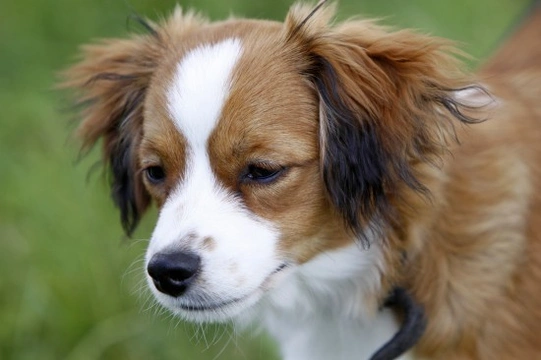Pets
Pets for studWanted petsBreedersAccessories & services
Knowledge hub
Support
Support & safety portal
Kooikerhondje hereditary health and health testing
The Kooikerhondje is a small breed of dog that originated in Holland, which reached the peak of their popularity in the 17th-18th centuries when they were featured in artwork by famous painters such as Rembrandt and Steen. Originally bred as a working dog breed to lure ducks into duck traps, while the Kooikerhondje is today a relatively unusual dog breed, they are fast growing in popularity across America, Scandinavia and within the UK.
The Kooikerhondje stands up to 17” tall at the withers, with females of the breed being smaller than males. They have a gentle, alert expression with soft, soulful eyes, and are red-orange and white in colour, with the main shade being white with large red patches.
They are renowned for being kind, loving dogs that form strong bonds with their families, and are generally calm and quiet within the home but lively and active while outside. They are reasonably intelligent and versatile, and can live quite happily within domestic homes of all types.
If you are wondering if the rather uncommon Kooikerhondje is the right choice of dog for you, it is important to do plenty of research into the breed before committing to make a purchase. This includes finding out about the general health of the breed, and if any health tests are advised, and what the average lifespan of dogs of the breed are. We will look into these factors in more detail in this article.
Kooikerhondje average longevity
The average lifespan of the Kooikerhondje is 12-14 years, which is towards the top of the average range across the board for dog breeds of a similar height and build. The Kooikerhondje is generally considered to be a healthy and robust dog, and not one that is overly fragile or prone to minor illnesses.
Genetic diversity
The coefficient of inbreeding statistic for the Kooikerhondje breed is 4.8%, which is considered to be low compared to most pedigree breeds, for which the ideal is 6.25% or lower. This indicates that the gene pool of the Kooikerhondje breed is wide and diverse, and not subjected to a significant degree of inbreeding.
Conformation
The conformation of the Kooikerhondje is considered to be well balanced and proportionate, and not subjected to overtyping or exaggerated traits that might affect the quality of life of dogs of the breed. Their coats are medium length and thickness, meaning that the dog is both capable of staying warm enough in all but the coldest of weather, and also, that it does not pose any problems to the dog when trying to keep cool in summer.
The Kooikerhondje should be relatively fit and lean, and not overweight, and needs to live a relatively active life to be able to keep fit and healthy.
Health testing for the Kooikerhondje
While the Kooikerhondje is considered over all to be a robust and generally healthy breed, the British Veterinary Association and The Kennel Club does recommend that breeding stock undergo pre-breeding health testing for a couple of hereditary conditions that can pose a risk to the breed as a whole. The current testing schemes available for the Kooikerhondje are:
- Hip score testing, to identify a propensity to hip dysplasia.
- DNA testing for necrotising myelopathy, a degenerative neural disorder.
- DNA testing for Von Willebrand’s factor, a condition that causes a blood clotting disorder in affected dogs.
Prospective buyers of Kooikerhondje puppies are advised to talk to the breeder selling the pups to find out what health tests have been performed on the parent dogs prior to breeding, and to ask to see evidence of results and scores.
Kooikerhondje general health
The Kooikerhondje is widely considered to be a robust, healthy breed that is fit for life and not prone to developing a wide range of health problems. The breed is not classed as a high profile breed, and the vast majority of dogs of the breed tend to live well into old age in good health.
However, as well as the known risk factors for which health testing of dogs is advised, the Kooikerhondje as a whole is also considered to have slightly elevated risk factors for a small range of other hereditary health conditions. While no wide scale pre-breeding testing is offered for these conditions, potential Kooikerhondje buyers are advised to make themselves aware of the following hereditary health risks:
- Epilepsy, with epileptic dogs not being considered as viable parent dogs. However, after diagnosis, epileptic dogs can generally lead an almost normal life and normal lifespan by means of medication to control the condition.
- Patellar luxation, a condition that leads to the kneecaps slipping and dislocating, as the muscle and ligament of the knee is unable to secure the kneecap in place properly. This may require surgical correction.
- Myasthenia gravis, an autoimmune disorder that ultimately leads to paralysis.
- Cataracts of the eyes, most commonly in old age.
- Renal dysplasia, a form of kidney disease.



